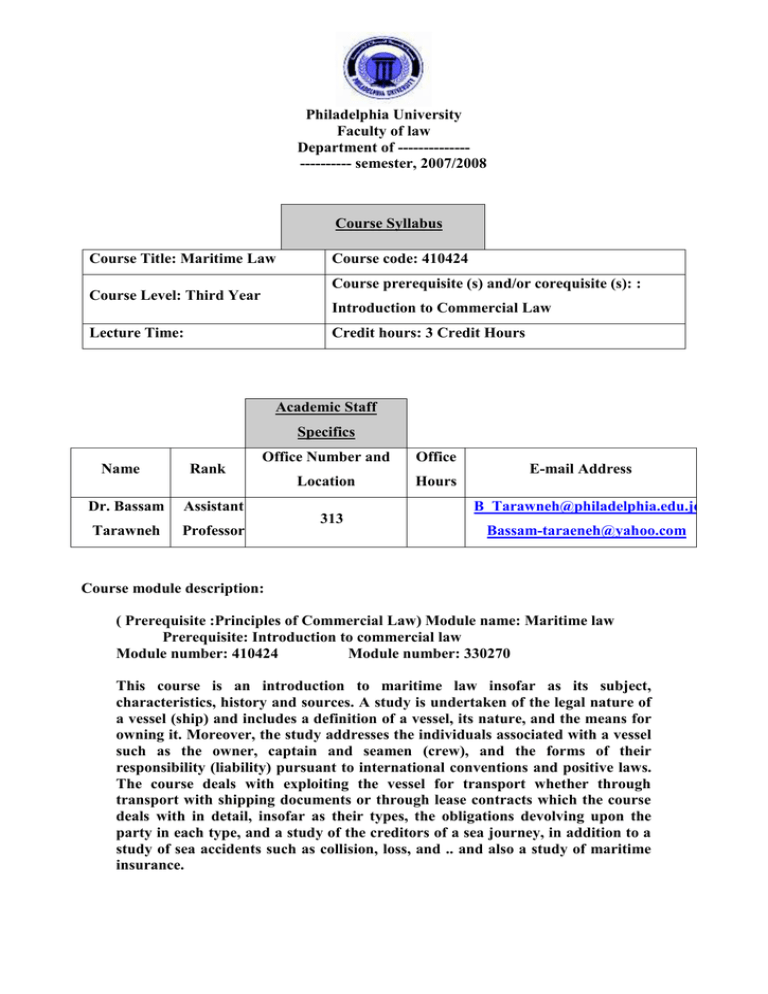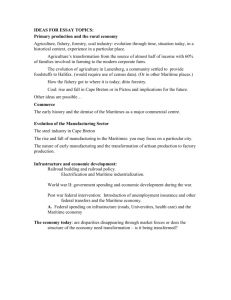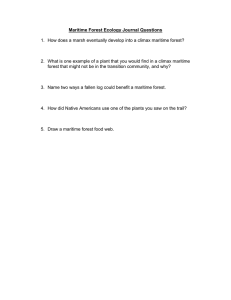Philadelphia University Faculty of law Department of --------------
advertisement

Philadelphia University Faculty of law Department of ----------------------- semester, 2007/2008 Course Syllabus Course Title: Maritime Law Course code: 410424 Course prerequisite (s) and/or corequisite (s): : Course Level: Third Year Introduction to Commercial Law Lecture Time: Credit hours: 3 Credit Hours Academic Staff Specifics Name Rank Dr. Bassam Assistant Tarawneh Professor Office Number and Office Location Hours 313 E-mail Address B_Tarawneh@philadelphia.edu.jo Bassam-taraeneh@yahoo.com Course module description: ( Prerequisite :Principles of Commercial Law) Module name: Maritime law Prerequisite: Introduction to commercial law Module number: 410424 Module number: 330270 This course is an introduction to maritime law insofar as its subject, characteristics, history and sources. A study is undertaken of the legal nature of a vessel (ship) and includes a definition of a vessel, its nature, and the means for owning it. Moreover, the study addresses the individuals associated with a vessel such as the owner, captain and seamen (crew), and the forms of their responsibility (liability) pursuant to international conventions and positive laws. The course deals with exploiting the vessel for transport whether through transport with shipping documents or through lease contracts which the course deals with in detail, insofar as their types, the obligations devolving upon the party in each type, and a study of the creditors of a sea journey, in addition to a study of sea accidents such as collision, loss, and .. and also a study of maritime insurance. Course module objectives: 1. provide students with the basic as well as advanced knowledge in issues related to Maritime Law and Jordanian Maritime Trade 2. develop students cognitive and practical skills in learning and discussing issues related to Maritime Law in addition to dealing with specific procedures of Maritime Trade Develop students written and oral skills, as well as encouraging them to effectively work as a time and to further benefit from modern techniques in deducing and extracting information Course/ module components Books (title , author (s), publisher, year of publication) Book Title Author Maritime Law Edition Publisher Dr. Adel Miqdadi Publishing Year Althaqafah Publishers Support material (s) (vcs, acs, etc). Study guide (s) (if applicable) Homework and laboratory guide (s) if (applicable). Examine texts of Maritime Trade Law in Jordan along with international pacts in the field of maritime transport, such as Bruxel and Hamburg pact Examine samples selected from maritime transport contracts through cargo, and to further understand the fixed conditions by tradesmen and training to discuss them Field visit. An outside lecturer, multipurpose room Research paper Teaching methods: Lectures, discussion groups, tutorials, problem solving, debates, etc. Methods Lectures Multipurpose room and field visits Student's involvement in seminars, tutorials, and group discussions Quizzes and Assignments Paper research & Essays (maximum of 3000words) Total Number of Lectures 39 2 5 Scores’ distribution 80% -------5% 2 ----- 5% 10% 48 100% 2001 Learning outcomes: Knowledge and understanding At the end of this module, a student will be able to: A/2 display the basic, advanced and specialized principles related to Maritime Trade and Law A/4 understand issues relevant to Maritime Law and Trade as well as their legal dimensions Cognitive skills (thinking and analysis). B/1 apply theoretical information and practical skills in the field of Maritime Law to actual practice B/3 analyze, interpret and assess the legislative texts and administrative and internal decisions, judicial interpretations, jurisprudential and theoretical opinions and other issues relevant to Maritime Law B/4 search through legislative texts of Maritime Law in order to deduce information to support knowledge Communication skills (personal and academic). C/1 search within the rules of Maritime Law and utilize sources of knowledge and find logical solutions bolstered by legal evidence for actual problems C/4display an ability to deduce information through the use of modern techniques and information technology C/5 prepare and formulate a variety of contracts that are directly used in Maritime Law and Trade Practical and subject specific skills (Transferable Skills). -------------------------------------------------------------------------------------------------------------------Assessment instruments Short reports and/ or presentations, and/ or Short research projects Quizzes. Home works Final examination: 50 marks Allocation of Marks Assessment Instruments Mark First examination 20% Second examination 20% Final examination: 50 marks 50% Reports, research projects, Quizzes, Home 10% works, Projects Total 100% Documentation and academic honesty Documentation style (with illustrative examples) -------------------------------------------------------------------------------------------------------------------------------------------------------------------------------------------------------------------------------------- Protection by copyright Avoiding plagiarism. Course/module academic calendar This module consists of (48) hours allocated into (16) weeks, (3) hours a week, divided as follows: Week Subject 1st Defining maritime law, its establishment, traits and origins 2nd 3rd 4th 5th 6th 7th 8th 9th 10th 11th 12th 13th 14th 15th 16th The legal nature of the ship/ Ship’s name, nationality, freight The legal nature of the ship/ a copy of ownership and its operation Ship persons/ the captain, sailors and transporter Utilization of ship/transport through cargo Utilization of ship/transport through cargo Utilization of ship/ international pacts in maritime transport Utilization of ship/transport contracts with rental conditions Utilization of ship/ transport contracts with rental conditions Utilization of ship/ transport contracts with rental conditions Abordage Rescue and aid Joint average loss Joint average loss Marine insurance Marine insurance Notes Expected workload: On average students need to spend 2 hours of study and preparation for each 50-minute lecture/tutorial. Attendance policy: Absence from lectures and/or tutorials shall not exceed 15%. Students who exceed the 15% limit without a medical or emergency excuse acceptable to and approved by the Dean of the relevant college/faculty shall not be allowed to take the final examination and shall receive a mark of zero for the course. If the excuse is approved by the Dean, the student shall be considered to have withdrawn from the course. Module references Books Book Title An Elucidation to Maritime Trade Law An Elucidation to Jordanian Maritime Trade Law Author Dr. Abdul Qader Alutair Saladin Alnahi Edition Publisher Althaqafah Publishers Publishing Year 2001 Journals Jordanian Law Society Journal Lawyers’ Journal Official newspaper Websites www.maritimedvocate.com www.miamnmaritmelaw.com www.movicanet.com


